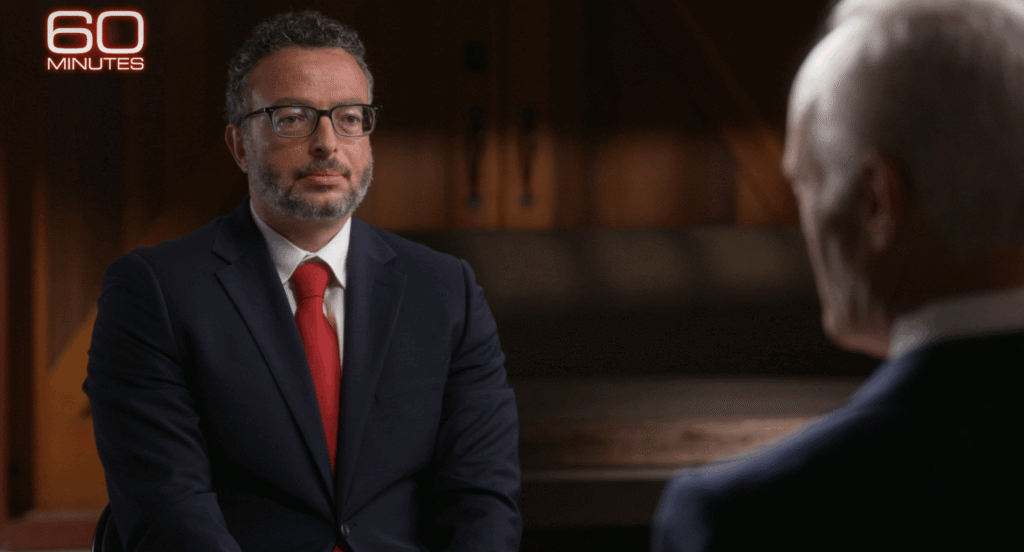When “60 Minutes” correspondent Scott Pelley sat down with former Justice Department attorney Erez Reuveni, the conversation peeled back the curtain on a powerful institution rarely seen from the inside. The segment explored Reuveni’s allegations of troubling conduct within the Department of Justice, focusing on the growing tension between law enforcement independence and political influence. For the first time on television, Reuveni spoke publicly about what he witnessed over his 15-year tenure before being dismissed—painting a portrait of a department wrestling with integrity, loyalty, and accountability.
- 60 Minutes Reports on “The Dealmakers”, “Erez Reuveni” & “Amy Sherald” October 19 2025
- The Dealmakers: 60 Minutes on Kushner and Witkoff’s Unlikely Path to Middle East Peace
- Amy Sherald: 60 Minutes Profiles the Artist Who Painted Michelle Obama and Redefined Representation
A Veteran Insider Speaks Out
Erez Reuveni’s story is not that of a political operative or career critic—it’s that of a veteran government lawyer who devoted over a decade to the Justice Department before finding himself at odds with its direction. As Pelley revealed, Reuveni’s legal career spanned multiple administrations, giving him a unique vantage point to observe how political priorities can subtly infiltrate an agency designed to stand apart from partisanship.
In his interview, Reuveni described witnessing a “pattern of troubling behavior” that he believed compromised the department’s independence. While specific details remain confidential, his account points to mounting internal pressure on attorneys to align legal interpretations with political narratives. His eventual firing, he suggested, was not the result of poor performance but of a principled refusal to bend the law to political will.
The Tension Between Justice and Power
The Reuveni segment on “60 Minutes” examined the delicate balance the Department of Justice must maintain—serving the executive branch while operating as an impartial enforcer of the law. Under Pelley’s questioning, the discussion turned toward the structural vulnerability that allows political leaders to influence the department’s priorities, particularly in high-profile cases involving allies or adversaries of those in power.
This is not the first time the DOJ’s independence has come under scrutiny. Throughout history, from the Watergate era to recent controversies, the department has been tested by administrations seeking loyalty over lawfulness. Reuveni’s testimony adds another layer to this ongoing narrative, suggesting that internal pressures have not only persisted but intensified in recent years.
A Pattern of Consequences
Reuveni’s firing has sparked debate within the legal community about how the Justice Department handles internal dissent. Some former colleagues have quietly praised his courage, calling his decision to speak out a “wake-up call” for reform. Others worry that his revelations may deepen public mistrust at a time when confidence in government institutions is already fragile.
The “60 Minutes” report also highlighted how whistleblowers like Reuveni often face professional isolation. The personal cost of challenging one’s employer—especially one as powerful as the DOJ—can be immense. Yet, as Pelley noted in his closing remarks, Reuveni’s decision to go public reflects a broader concern that silence enables systemic problems to endure unchecked.
Implications for Accountability and Reform
Beyond the individual story, “Erez Reuveni” underscores a fundamental question: how can the Department of Justice safeguard its independence in an increasingly polarized political climate? The episode raised issues that reach beyond Reuveni’s experience, touching on the mechanisms of oversight, the limits of executive influence, and the moral weight carried by public servants in positions of power.
Pelley’s report framed the conversation within a larger national reckoning over truth, law, and accountability. By allowing Reuveni’s voice to be heard, “60 Minutes” reignited a critical discussion about whether the Justice Department’s structure—and the culture within it—can still withstand the pressures of modern politics. For viewers, the takeaway was as unsettling as it was urgent: the rule of law depends not only on statutes but on the courage of those willing to defend them.
More 60 Minutes October 19 2025
- 60 Minutes Reports on “The Dealmakers”, “Erez Reuveni” & “Amy Sherald” October 19 2025
- The Dealmakers: 60 Minutes on Kushner and Witkoff’s Unlikely Path to Middle East Peace
- Erez Reuveni: 60 Minutes Examines a Whistleblower’s Fight Inside the Justice Department
- Amy Sherald: 60 Minutes Profiles the Artist Who Painted Michelle Obama and Redefined Representation
More Feature Articles
- “A Perfect Spring Morning”: Dateline Reports on Leslie Preer Homicide October 17 2025
- “Driven to Death”: 20/20 Reports on Gregory Rice Homicide, Meagan Jackson & Christopher Dontell’s Affair October 17 2025
- “My Uncle Joe’s Murder”: 48 Hours Investigates Joe Shymanski Homicide October 18 2025
- 60 Minutes Reports on “The Dealmakers”, “Erez Reuveni” & “Amy Sherald” October 19 2025

